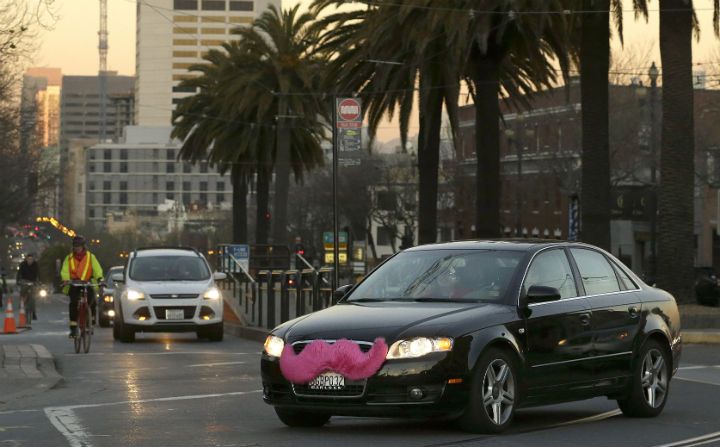
A Lyft car in San Francisco (AP Photo/Jeff Chiu, File)
The jury is still out on whether Uber and Lyft are a boon or bust for disabled riders. Some say the services represent a promising partnership to replace cities’ expensive and often slow door-to-door paratransit offerings, and Boston and D.C. have put that theory to the test. Critics say the companies’ drivers and their often non-ADA compliant cars aren’t equipped to do the job.
Nonetheless, this week carpooling app Splt announced it is partnering with Lyft to provide on-demand non-emergency medical transport for people seeking access to medical care. The largest underserved demographic here is not disabled people, though, but seniors, a quarter of whom do not own smartphones. So Splt’s new platform will allow customers to schedule a ride using text messaging, a phone call, the web or a smartphone app. Many services currently require patients to book transportation at least four days in advance, and can sometimes leave patients stranded after their appointment. With this partnership, Splt hopes to reduce pre-booking times to a few hours. Lyft will provide the drivers.
The service will launch in Detroit, where Splt moved last year to participate in Techstars Mobility, a startup incubator for automotive businesses. Its main service is an app-based platform for companies to launch ride-share and carpooling services for their employees. Patients at Detroit’s Beaumont Health will be the first to test the service this fall. While Lyft drivers will show up at customer’s doors, Splt will do the back-end work: verifying Medicaid, getting insurance reimbursement for the rides, dispatching, marketing and customer service. Splt is also working with ambulance companies to train dispatch personnel and drivers.
“This deal lets Lyft focus on its core business, and it lets Splt focus on our core business, which is helping people connect to share rides,” said Splt founder and CEO Anya Babbitt at a pitch event in Palo Alto last week.
Gyre Renwick, head of enterprise health care partnerships at Lyft, said in a press release, “It’s our mission to connect people and communities through effective, affordable, safe and accessible transportation, and Splt’s concept is a great way to deliver our services to the underserved.”